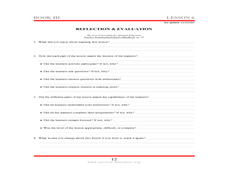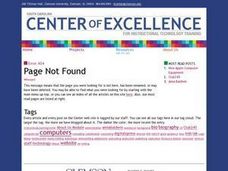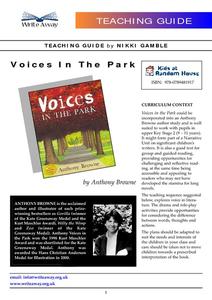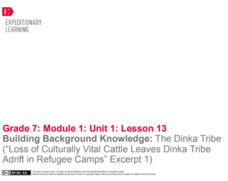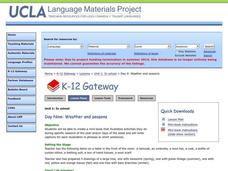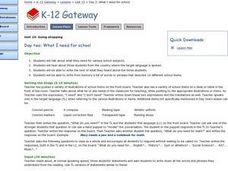Geography 360°
Poetry Writing
Put the tips and tricks in this guide into practice in order to encourage your pupils to blossom into poets. A wonderful reference material for teachers, this packet includes definitions of poetic terms and forms as well as step-by-step...
Digital Public Library of America
Teaching Guide: Exploring To Kill a Mockingbird
Harper Lee's To Kill a Mockingbird, considered by many to be a seminal piece of American literature, contains many complex literary themes that carry through United States history. Use a series of discussion questions and classroom...
Curated OER
How to Explore Religious Teachings Without Prejudice
Setting goals plays a major role in becoming a self motivated learner. Students will read and discuss a story, set personal goals, and analyze a sacred prayer. This lesson includes: teacher evaluation, goal worksheet, prayers, story, and...
Curated OER
Collective Poetry: Teaching Tolerance
Help your class create collective poetry following a simple, engaging model from Teaching Tolerance (tolerance.org). Each young poet writes five things on an index card: sayings from others, favorite sound, favorite place, favorite...
Museum of Disability
A Picture Book of Helen Keller
Teach your class about Helen Keller and her accomplishments with a reading comprehension lesson based on A Picture Book of Helen Keller by David A. Adler. As individuals read, they answer discussion questions about Helen Keller and the...
Curated OER
Two Greedy Bears
Improving listening comprehension skills is the goal of this language arts lesson. Young readers listen to the story Two Greedy Bears, stopping to have discussions with a partner. They predict outcomes and make inferences based on...
Curated OER
English/Language Arts Methods Project
Students design a webquest requiring higher order thinking and providing students with opportunities to reflect on their learning. They include an assessment tool to evaluate the process and product.
Write Away!
Voices In the Park
Explore the impact a narrator's point of view has on a story with a reading of the children's book, Voices in the Park by Anthony Browne. Written in four different voices, the story is told and retold from different perspectives to...
Curated OER
Cross-Cultural Dialogue Lesson
Students read and analyze a personal narrative written about a Peace Corps Volunteer teaching English in Guinea-Bissau, Africa. They discuss the concept of crossing cultures, analyze maps, complete worksheets, and develop a writing...
BBC
The Sound Monster - Words That Make Sounds
There are words in the English language that actually make sounds, such as vroom, and, buzz. Here is a clever lesson which introduces young readers to these sound-making words. They play an interactive game on the computer that has them...
The New York Times
Teaching the Vietnam War with Primary Sources from the New York Times
Use the New York Times database of primary sources to teach a unit on the Vietnam War. The resource consists of a variety of primary sources as well as a lesson plan showcasing how to teach a lesson using them. Pupils analyze the sources...
EngageNY
Building Background Knowledge: The Dinka Tribe (“Loss of Culturally Vital Cattle Leaves Dinka Tribe Adrift in Refugee Camps” Excerpt 1)
Text annotations help readers track essential ideas. Pupils continue reading and annotating an informational article about Sudanese tribes, connecting it with A Long Walk to Water by Linda Sue Park. They also begin writing about their...
EngageNY
Writing to Show, Not Tell: Dialogue, Sensory Words, and Strong Action Verbs
Consume, gobble, devour ... serving up strong verbs! Writers focus on using dialogue, strong action verbs, and sensory details in their writing. After analyzing a model narrative, they apply their learning to their own hero's journey...
Roald Dahl
Charlie and the Chocolate Factory
You can't read Roald Dahl's Charlie and the Chocolate Factory without craving the rich treats described in Dahl's vivid prose. Young writers try their hands at sensory language with a lesson plan that prompts them to write about their...
Curated OER
Teach Text Features & Read Nonfiction
Elementary schoolers examine the components of reading nonfiction. They use think-alouds to help them complete reading the selected sections. They also identify text features as they read.
Digital Public Library of America
Teaching Guide: Exploring Little Women
Louisa May Alcott's Little Women is a literary masterpiece as well as a timestamp of the formative mid-nineteenth century in America. Using a primary source set of photographs, letters, and portraits, readers discuss the ways...
Curated OER
Figurative Language in Toni Morrison's "A Mercy"
In order to read and respond to Toni Morrison's A Mercy in this figurative-language lesson, young scholars discuss the differences between a literal and a figurative interpretation of a text. They explore figures of speech using a...
Read Write Think
Poetry Portfolios: Using Poetry to Teach Reading
Over the course of five periods, scholars create a poetry portfolio. They begin with a reading of the poem, Firefly. With a focus on vocabulary, learners reread the poem then look for sight words and other skills.
Achieve3000
Discriminating Phonemes 2
Some sounds sound very similar! Help your class learn how to distinguish between various sounds by following the steps outlined in this plan. The plan includes a warm-up, a teacher-led portion, and details for guided and independent...
EngageNY
Advocating Persuasively in a Fishbowl: Practice
What makes a good advocate? An informative lesson plan teaches class members how to advocate persuasively. They participate in a fishbowl activity and listen to the teacher model advocating persuasively. They then practice independently,...
Scholastic
Quick as a Cricket Lesson Plan
Teaching young learners about similes is easy as pie with this primary grade language arts activity. Following a class reading of the children's book, Quick as a Cricket by Audrey Wood, young readers learn the definition of a simile as...
Curated OER
Weather and Seasons
Use pictures and manipulatives to develop vocabulary with your beginning language learners. This plan can be used with foreign language learners (although you'll have to provide the vocabulary), English language learners, or a young...
Curated OER
What I need for School
You can use this lesson with English language learners, a young language arts class, or speakers of a foreign language. The phrases learned are I need and I don't need. The teacher collects several items around the room, and learners...
George W. Bush Presidential Library and Museum
Teaching Primary and Secondary Sources
What makes a source primary or secondary? Middle schoolers read a definition of each term before exploring different examples and applying their knowledge to a research project.




